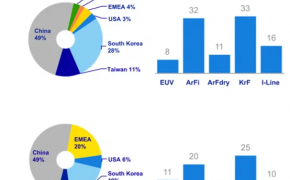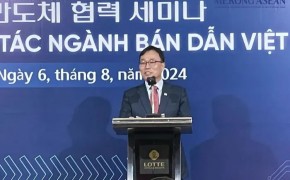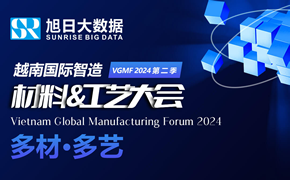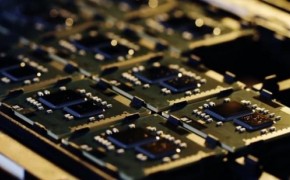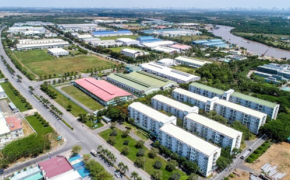近日荷兰半导体公司BE Semiconductor Industries NV(BESI),计划向其位于胡志明市的高科技园区(SHTP)的微芯片封装和测试设备生产工厂,再注入4200万美元(约合人民币3.05亿)进行扩产。7月11日SHTP管理委员会向胡志明市人民委员会发出了一份报告,请求考虑和批准BESI的二期扩产项目,胡志明市人民委员会批准了扩大BESI项目的投资注册文件的解决方案。SHTP管理委员会意识到BESI二期扩产项目的目标和规模符合I-14.6地块用途,占地1.98公顷,BESI将利用该地块用于建设生产微芯片生产线设备和机械的工厂,将于2025年6月开始建设。
目前胡志明市的半导体产业主要由英特尔推动,据了解,英特尔在胡志明市拥有一家总投资15亿美元的工厂,自2010年启用以来,已成为其最大的芯片组装、封装和测试基地,员工数量达到2800人,累计生产超过30亿件产品。
外界认为BESI在胡志明市临近英特尔建厂并扩产的主要原因,是未来行业可能会有越来越多的AI服务器产能,集中到越南生产,而AI服务器的AI芯片,目前正在推动混和键合技术进行2.5D和3D超大规模集成封装,作为全球最主要的芯片混和键合技术设备供应商,BESI布局越南能够实际就近服务客户,并且更快的与客户一起进行设备迭代,从而占据行业先机。
2021年,在COVID危机期间的半导体热潮中,BESI宣布,英特尔和台积电都承诺购买50台混合键合机。订单真正开始增长是在2023年,所以这些计划似乎有些延迟,但Besi表示它已经有能力每年生产180台混合键合机。如果这个产能得到充分利用,将意味着额外的4亿欧元销售额。
目前代工AI服务器的主要厂商鸿海集团已经把越南建设成为其全球第二大生产基地,在多个省份建立了工业园区,从PCB、交换机芯片到整机组装,都有产能;和硕越南厂则位于越南海防市的新兴工业区,主要服务微软;仁宝目前在越南永福省有两座厂房,为最早进入越南的中国台湾代工厂,近年持续加大投资,在越南主要生产网通、智能装置等产品;纬创2019年前进越南设厂,落脚北越河南省同文工业区,主要生产ICT产品,近期启动越南二厂扩建完成,生产笔记本电脑和显示器产品;英业达2022年初设立越南子公司,已取得越南河内市富川县大川社南河内支持性产业工业园区第一期CN03地块土地使用权,后续会在越南生产智能手持装置;广达集团在越南南定省美顺工业区设厂,第一阶段厂区面积22.5公顷,力拼2024年底投产,日前并携手当地官方签署“电脑生产计划协议”,主要代工苹果MacBook组装订单。
近些年,越南政府正在积极采取措施以吸引更多外资企业,半导体、高科技行业成为外资重点关注的领域,如韩国三星集团在越南投资190亿美元,修建6家工厂和1个研发中心。此外,苹果、谷歌、戴尔、亚马逊等世界制造商巨头也在越南设立生产基地。
不过越南在今年开始实施最低税负制度,要求跨国公司在其运营所在租税管辖区的有效税率低于15%时,须缴纳补充税款(Top-upTax)给母国。越南国会于2023年11月29日通过了一项决议,决定从2024年1月1日起对连续四年内总收入达到7.5亿欧元或以上的跨国企业征收15%的企业所得税。
越南的最低税负制度实施后,全球投资者对越南的投资有所降温,越南今年上半年的外资投资增长,主要依赖台湾、新加坡、香港和中国大陆的资本,而且很多香港和新加坡的投资,也是中国大陆设在当地的分支机构动作,其最终来源还是中国大陆的投资资本。
今年上半年很多投资项目都在等待越南政府给予另外的租税补贴,但却迟迟没有下文,因而搁置投资计划,包括日本SMC公司在南部同奈省价值5-10亿美元的医疗设备制造项目。鸿海旗下富士康、仁宝和广达等台厂的扩厂计划也因此搁置。
不少企业已经放弃对越南的投资扩张,这对于越南政府而言无疑是沉重一击,因为越南正积极吸引外资进入半导体产业,特别是在芯片制造的各个关键环节。在过去的一年里,越南政府竭力向海外芯片制造商展示其投资吸引力。
而据越南投资部在6月底的文件中表示,等不及的美国芯片巨头英特尔曾计划在越南投资33亿美元,并要求该国提供15%的现金支持,但最终决定将该项目转移到波兰;韩国LG化学也放弃了在越南投资的计划,转而在印尼投资了一个电池项目,该公司此前曾要求越南承担30%的投资成本;奥地利半导体制造商奥特斯(AT&S)则决定在马来西亚投资。
特别是马来西亚,政储最近发布了《国家半导体产业战略(NSS)》,计划直接向马来西亚半导体产业提供至少250亿令吉(约合人民币385.3亿元)的补贴,并吸引至少5000亿令吉(约合人民币7705亿元)的本土及外国的企业投资,主要投向芯片设计、先进封装和半导体制造设备等关键领域。马来西亚的补贴政策,给临近的越南半导体产业扩张策略,带来了很大的压力。
这种情况下,荷兰BESI的胡志明市二期扩产动作,无疑是给了越南政府一个很大的帮助,为越南的半导体投资环境宣传,起到了正面的作用。
Recently, Netherlands semiconductor company BE Semiconductor Industries NV (BESI) plans to inject another US$42 million (about 305 million yuan) into its microchip packaging and testing equipment production plant in the Hi-Tech Park (SHTP) in Ho Chi Minh City to expand production. On July 11, the SHTP Management Committee sent a report to the Ho Chi Minh City People's Committee requesting consideration and approval for the second phase of the BESI expansion project, and the Ho Chi Minh City People's Committee approved the solution to expand the investment registration documents of the BESI project. The SHTP Management Board is aware that the objectives and scale of the BESI Phase II expansion project are in line with the I-14.6 plot use, covering an area of 1.98 hectares, which BESI will use for the construction of a plant for the production of equipment and machinery for the microchip production line, which will begin construction in June 2025.
At present, the semiconductor industry in Ho Chi Minh City is mainly driven by Intel, it is understood that Intel has a factory in Ho Chi Minh City with a total investment of 1.5 billion US dollars, since its opening in 2010, it has become its largest chip assembly, packaging and testing base, with 2,800 employees and a cumulative production of more than 3 billion products.
The outside world believes that the main reason for BESI to build a factory and expand production near Intel in Ho Chi Minh City is that the industry may have more and more AI server production capacity in the future, concentrated in Viet Nam production, and AI server AI chips, is currently promoting hybrid bonding technology for 2.5D and 3D ultra-large-scale integrated packaging, as the world's most important chip hybrid bonding technology equipment supplier, BESIThe layout of Viet Nam can actually serve customers nearby, and carry out equipment iteration with customers faster, so as to occupy the industry opportunity.
In 2021, amid the semiconductor boom during the COVID crisis, BESI announced that both Intel and TSMC had committed to purchasing 50 hybrid bonders. Orders really start to grow in 2023, so those plans seem to be delayed somewhat, but Besi says it already has the capacity to produce 180 hybrid bonders per year. If this capacity is fully utilized, it will mean an additional 400 million euros in sales.
At present, Hon Hai Group, a major manufacturer of foundry AI servers, has built Viet Nam into its second largest production base in the world, and has established industrial parks in many provinces, with production capacity from PCB, switch chips to complete machine assembly; Pegatron Viet Nam is located in the emerging industrial zone of Haiphong City, Viet Nam, mainly serving Microsoft; Compal currently has two factories in Vinh Phuc Province, Viet Nam, which is the first foundry in Taiwan, China to enter Viet Nam, and has continued to increase investment in recent years, mainly producing networking, smart devices and other products in Viet Nam; Wistron set up a factory in Viet Nam in 2019, located in Dong Boon Industrial Zone, Henan Province, North Vietnam, mainly producing ICT products, and recently started the expansion of the second factory in Viet Nam to produce notebook computers and monitor products; Inventec established a subsidiary in Viet Nam at the beginning of 2022 and has obtained the land use right of the first phase of the CN03 plot of the South Hanoi Supportive Industrial Industrial Park in Dachuan She, Bu Chuan District, Hanoi City, Viet Nam, and will produce smart handheld devices in Viet Nam in the future. Quanta Group has set up a factory in My Thuan Industrial Zone, Nam Dinh Province, Viet Nam, with a plant area of 22.5 hectares in the first phase, striving to put into production by the end of 2024.
In recent years, the Viet Nam government is actively taking measures to attract more foreign-funded enterprises, and the semiconductor and high-tech industries have become key areas for foreign investment, such as Korea's Samsung Group invested 19 billion US dollars in Viet Nam to build 6 factories and 1 R&D center. In addition, world manufacturer giants such as Apple, Google, Dell, and Amazon have also set up production bases in Viet Nam.
However, Viet Nam began implementing a minimum tax system this year, requiring multinational companies to pay a top-up tax to their home country when the effective tax rate in the taxable jurisdiction in which they operate is less than 15%. Viet Nam's National Assembly passed a resolution on November 29, 2023, deciding to impose a 15% corporate income tax on multinational companies with total revenues of €750 million or more for four consecutive years from January 1, 2024.
After the implementation of Viet Nam's minimum tax system, global investors' investment in Viet Nam has cooled, and Viet Nam's foreign investment growth in the first half of this year mainly relies on the capital of Taiwan, Singapore, Hong Kong and Chinese mainland, and many Hong Kong and Singapore investments are also local branches in Chinese mainland, and their ultimate source is Chinese mainland investment capital.
In the first half of this year, many investment projects were waiting for additional tax subsidies from the Viet Nam government, but they were delayed, so investment plans were shelved, including Japan's SMC company's $5-1 billion medical equipment manufacturing project in the southern province of Dong Nai. Hon Hai's Taiwanese factories such as Foxconn, Compal and Quanta have also shelved their expansion plans.
Many companies have given up on investment and expansion in Viet Nam, which is undoubtedly a heavy blow to the Viet Nam government, because Viet Nam is actively attracting foreign investment into the semiconductor industry, especially in all key links of chip manufacturing. Over the past year, the Viet Nam government has worked hard to demonstrate its investment attractiveness to overseas chipmakers.
According to the Viet Nam Ministry of Investment in a document at the end of June, the United States chip giant Intel had planned to invest $3.3 billion in Viet Nam and asked the country to provide 15% cash support, but finally decided to transfer the project to Poland; Korea's LG Chem has also abandoned plans to invest in Viet Nam in favor of a battery project in Indonesia, which had previously asked Viet Nam to bear 30% of the investment costs; Austria semiconductor manufacturer AT&S has decided to invest in Malaysia.
In particular, in Malaysia, the government recently released the National Semiconductor Industry Strategy (NSS), which plans to directly provide subsidies of at least RM25 billion (about 38.53 billion yuan) to Malaysia's semiconductor industry, and attract at least RM500 billion (about 770.5 billion yuan) of local and foreign enterprise investment, mainly in key areas such as chip design, advanced packaging and semiconductor manufacturing equipment. Malaysia's subsidy policy has put great pressure on the expansion strategy of the nearby Viet Nam's semiconductor industry.
In this case, the second phase expansion of Netherlands BESI in Ho Chi Minh City has undoubtedly given a great help to the Viet Nam government and played a positive role in promoting Viet Nam's semiconductor investment environment.
